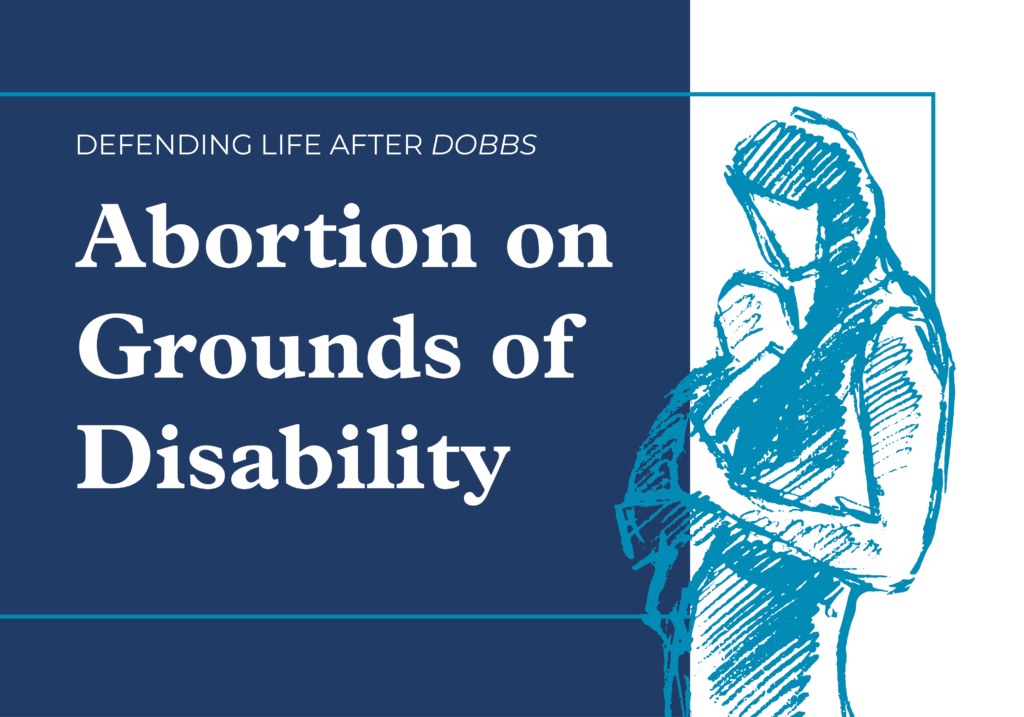
Published July 19, 2023
One form of “selective” abortion follows a diagnosis of a genetic or fetal anomaly of the child in utero. Such anomalies can be relatively minor, for instance polydactyly (an extra finger) or cleft lip or palate. Far more widespread, however, is the practice of abortion in cases of chromosomal conditions such as Down syndrome, medical conditions such as cystic fibrosis, and structural defects such as malformations of the unborn child’s brain, heart, or kidneys.
Though comprehensive data on reasons for abortion is not recorded in the U.S., it is estimated that “the health of the fetus” supplies grounds in up to three percent of all abortions (approximately 27,000 unborn children annually). For unborn children diagnosed with Down syndrome, meta-analyses of studies suggest an abortion rate in the U.S. of between 67 percent and 90 percent.
Certainly, the frequency of selective abortion is driven in part by the routine nature of prenatal testing—whether via ultrasound technology, first employed for diagnostic use in 1956, or via amniocentesis, first introduced for Down syndrome diagnostic testing in 1966. Other prenatal diagnostic methods include chorionic villus sampling and via non-invasive prenatal genetic testing that has been available since 2012. But the development of the technology alone is not determinative of whether abortion will follow. Prenatal testing can help expecting parents prepare to raise children with disabilities.
What has proven crucial to the rise of selective abortion is the cultural acceptance of the idea that abortion is a “cure” for disability—the public legitimization of the view that the way to eliminate suffering is to eliminate the sufferer. As disability-rights campaigner Mary O’Callaghan explains, “The convergence of breakthroughs in genetic testing in the 50’s and 60’s, followed by the legalization of abortion in the 70’s, allowed health care to turn ‘wouldn’t it be better if the disability did not exist’ into ‘wouldn’t it be better if the person with the disability did not exist?’”
Opinion in our society is sharply divided between those who think abortion on grounds of disability is less objectionable—reflected in state laws that have historically allowed abortion for fetal anomaly later in pregnancy—and those who insist that selective abortion remains objectionable (or is even more objectionable).1 In this latter group are disability-rights activists who have leveled the “expressivist” critique of selective abortion, namely that aborting an unborn child diagnosed with a disability, at whatever stage of gestation, conveys to those living with disabilities a highly derogatory and discriminatory message about the fundamental worth of their lives.
In selective abortion “the trait [is allowed to] obliterate the whole,” as the late disability-rights activist Adrienne Asch put it. “With both discrimination and prenatal diagnosis, nobody finds out about the rest [of the person]. The test sends the message that there’s no need to find out about the rest.”2 Others view the part of a person which is their disability as a substitute for the whole person, who is summarily rejected through abortion. This type of selective abortion implicitly views a person as their disability, expressing and perpetuating the perception that “people are reducible to a single, perceived-to-be undesirable trait.” As another disability-rights activist, Marsha Saxton, writes:
The message at the heart of widespread selective abortion on the basis of prenatal diagnosis is the greatest insult: some of us are “too flawed” in our very DNA to exist; we are unworthy of being born… [F]ighting for this issue, our right and worthiness to be born, is the fundamental challenge to disability oppression; it underpins our most basic claim to justice and equality—we are indeed worthy of being born, worth the help and expense, and we know it!3
This powerful assertion suggests that the decades-long struggle to combat discrimination against persons with disabilities will stall so long as selective abortion remains legally permissible and widespread.
The dilemma facing parents of unborn children diagnosed with disabilities—the “poisoned chalice of knowledge and choice,” in the words of one parent—confronts us with deep questions about the meaning of parenthood. “To appreciate children as gifts,” writes Harvard philosopher Michael Sandel, “is to accept them as they come, not as objects of our design or products of our will or instruments of our ambition.”4 That, essentially, is the ideal being contested. Because recognizing the unborn child who has tested positive for Down syndrome, cystic fibrosis, or Tay Sachs as a gift suggests a concrete response: love. And if love means, at the very least, turning to someone and saying, “It’s good that you exist; it’s good that you are in the world!” then love cannot be expressed in any way you like. However merciful one’s motives, saying “I love you” or “I’m glad you’re here” is incompatible with ending the life of the unborn child diagnosed with a disability or expected to have a foreshortened life.
Endnotes:
- Heloise Robinson, “Abortion on the Basis of a Risk of Disability: The Parents’ Interests and Shared Interests,” in Philosophical Foundations of Medical Law, eds. AM Phillips, TC de Campos and J Herring (Oxford: Oxford University Press, 2019).
- Adrienne Asch, quoted in Erik Parens and Adrienne Asch, “The Disability Rights Critique of Prenatal Genetic Testing: Reflections and Recommendation,” in Prenatal Testing and Disability Rights, ed. Erik Parens and Adrienne Asch (Washington D.C.: Georgetown University Press, 2000), pp. 3–43, at 13.
- Marsha Saxton, “Disability Rights and Selective Abortion,” in Abortion Wars: A Half Century of Struggle, 1950–2000, ed. Rickie Solinger (Berkeley and Los Angeles: University of California Press, 1997), pp. 374–95, at 391.
- Michael Sandel, “The Case Against Perfection: What’s wrong with designer children, bionic athletes, and genetic engineering,” The Atlantic, April 2004 Issue (accessed via https://www.theatlantic.com/magazine/archive/2004/04/the-case-against-perfection/302927/).












